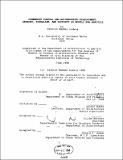| dc.contributor.advisor | Nabeel Hamdi. | en_US |
| dc.contributor.author | Ludwig, Kathryn Madden | en_US |
| dc.contributor.other | Massachusetts Institute of Technology. Dept. of Architecture. | en_US |
| dc.date.accessioned | 2013-01-07T21:12:20Z | |
| dc.date.available | 2013-01-07T21:12:20Z | |
| dc.date.copyright | 1988 | en_US |
| dc.date.issued | 1988 | en_US |
| dc.identifier.uri | http://hdl.handle.net/1721.1/75999 | |
| dc.description | Thesis (M.S.)--Massachusetts Institute of Technology, Dept. of Architecture, 1988. | en_US |
| dc.description | Includes bibliographical references (leaves 113-117). | en_US |
| dc.description.abstract | This thesis explores the conditions of community control and neighborhood development. The existing theories of anarchy, pluralism and supports, as found in the literature, form the groundwork for the thesis argument. The theories are used to construct conceptual models of community control applicable to urban neighborhoods in the current United States context. These models describe different worlds according to the conditions of social structure, the nature of interaction, the availability of resources, and the tools for control of the building process. In order to test the usefulness of the models, the thesis analyzes a real case according to the conditions set up in the theoretical models. The thesis presents the story of a recent struggle over the future of the land and its development in the South End neighborhood of Boston, Massachusetts. The South End is a unique case, yet its lessons parallel those of similar struggles in Boston's working class and poor neighborhoods. The analysis of the case reveals insights about the usefulness of the models. In the conclusion, the thesis considers the value of the theoretical approach. The models are set up to characterize different worlds, but in the end describe different perspectives of the same world. The world appears differently in the models depending on one's relative position, the scale of operation, and the particular stage in a dynamic process of community control. The theoretical framework presented in this thesis, like all rules and supports structures, must be challenged, dismantled, and rebuilt over time to accommodate changing conditions and new experiences. | en_US |
| dc.description.statementofresponsibility | by Kathryn Madden Ludwig. | en_US |
| dc.format.extent | 117 leaves | en_US |
| dc.language.iso | eng | en_US |
| dc.publisher | Massachusetts Institute of Technology | en_US |
| dc.rights | M.I.T. theses are protected by
copyright. They may be viewed from this source for any purpose, but
reproduction or distribution in any format is prohibited without written
permission. See provided URL for inquiries about permission. | en_US |
| dc.rights.uri | http://dspace.mit.edu/handle/1721.1/7582 | en_US |
| dc.subject | Architecture. | en_US |
| dc.title | Community control and neighborhood development : anarchy pluralism, and supports as models for analysis | en_US |
| dc.title.alternative | Neighborhood development, Community control and | en_US |
| dc.type | Thesis | en_US |
| dc.description.degree | M.S. | en_US |
| dc.contributor.department | Massachusetts Institute of Technology. Department of Architecture | |
| dc.identifier.oclc | 18809333 | en_US |
